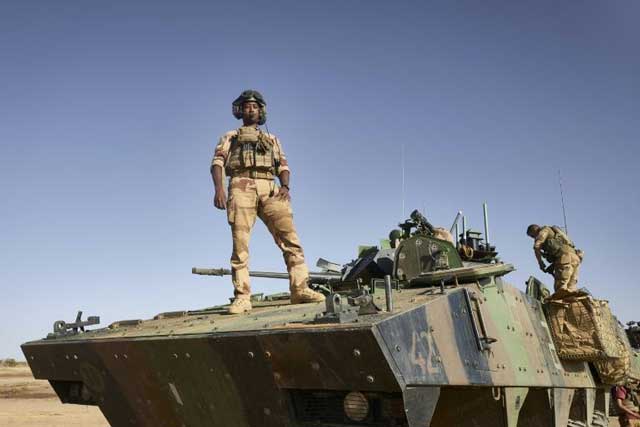
Nouakchott, Mauritania | AFP | The Sahara: boundless dunes shimmering in the relentless heat, nomadic tribes following paths as old and inscrutable as time itself, fierce-eyed warriors on camel-back, clad in indigo…
These images of the great desert are familiar around the world, but in France they have a special allure.
France, say historians, has a deeply romantic notion of the western Sahara, forged in colonial times and tinged by the literature that emerged from it.
The honeyed perspective endures today but has been eclipsed by pragmatism as France pursues its military commitment to the Sahel.
“The French vision of the Sahara comes from camel-mounted French troops” of a century ago, suggests Thierry Tillet, a French archaeologist who has been exploring the Sahara for half a century.
This specialised corps of France’s Army of Africa battled nomads for decades before emerging victorious in the mid-1930s.
From their adventures emerged a canon of literature about derring-do in the desert and the Tuareg, its hardy people.
Sahara novels flowed from the pens of Joseph Peyre, whose brother was in the camel corps, Pierre Benoit and Antoine de Saint-Exupery, who later gained worldwide acclaim as the author of “The Little Prince,” Tillet said.
Newspapers and magazines helped cement the romance, said Pierre Touya, of the Association of Saharans, a 64-year-old organisation in Paris whose membership of more than 800 includes archaeologists, geographers and other specialists.
– ‘Untrustworthy or noble’ –
But colonial-era writings about the Tuareg — the main inhabitants of the Sahara — also bred stereotypes, said Adib Bencherif, an Algerian researcher at the University of Florida.
Tuaregs, he said, were typically depicted as one of two things — “rebellious and untrustworthy” or “noble and free.”
A century or so later, the frontier notion of the Sahara still colours French involvement in the region.
French blood and treasure have been committed to fighting a jihadist revolt in the Sahel that erupted after Libya’s descent into civil war following the death of Moamer Kadhafi in 2011.
Its Barkhane force of 5,100 troops are supporting four poor former colonies — Mali, Niger, Burkina Faso and Chad — battling an insurgency that threatens to expand southwards, towards the Gulf of Guinea.
Colonial-era perceptions of the nomad fighter still prevail among French soldiers, a Barkhane officer acknowledged, pointing to the “desert warrior” image of Chadian President Idriss Deby Itno, a general who is a close French ally.
Among rebel groups, “certain leaders have played on this colonial fantasy with French soldiers, and still do,” a senior Malian rebel said, speaking on condition of anonymity.
“Look at Mano Dayak,” the source said, referring to a leader of a Tuareg revolt in Niger in the 1990s.
“He was a rebel and yet at the same time organised the Paris-Dakar” motor rally.
– Enigma of Kidal –
The intertwined French-Tuareg relationship may well have a connection with the “special” status of Kidal, a northern Malian town that has been turned into a de-facto fiefdom by Tuareg rebels, said Mohamed Fall Ould Bah, a Mauritanian anthropologist at the Centre for Study and Research on West Sahara.
Kidal is a stronghold of the Ifogha, a clan within the Tuareg community which became predominant locally under French colonial rule.
The French officer who spoke to AFP confirmed that the Ifogha retained a special relationship with the French, particularly the intelligence service.
In 2013, France launched Operation Serval to roll back jihadists in northern Mali.
Its troops entered Kidal with the help of an armed rebel Tuareg group, the National Movement for the Liberation of Azawad (MNLA), rather than with the Malian army.
France’s then defence minister, Jean-Yves Le Drian, said there was a “functional relationship” with the MNLA, who he said was “coordinating” with the French.
Critics of France’s military presence often brandish the events of 2013 and Kidal’s status as proof of double-talk in France’s declared attachment to Malian sovereignty.
Another French officer in the Sahel played this down: “There have been links between the MNLA and France, there is a colonial past, that’s true — but not everything is based on this, far from it.”
Yvan Guichaoua, a researcher at Britain’s University of Kent, said the French military “need operational knowledge” from local populations.
They drew on “simplistic anthropology rooted in colonial literature” to search for a source — a notion that today still “provides the background for certain decisions,” he said.
Even so, said Guichaoua, “operational pragmatism” is more important.
“The military are willing to change alliance if this means greater effectiveness.”
 The Independent Uganda: You get the Truth we Pay the Price
The Independent Uganda: You get the Truth we Pay the Price



